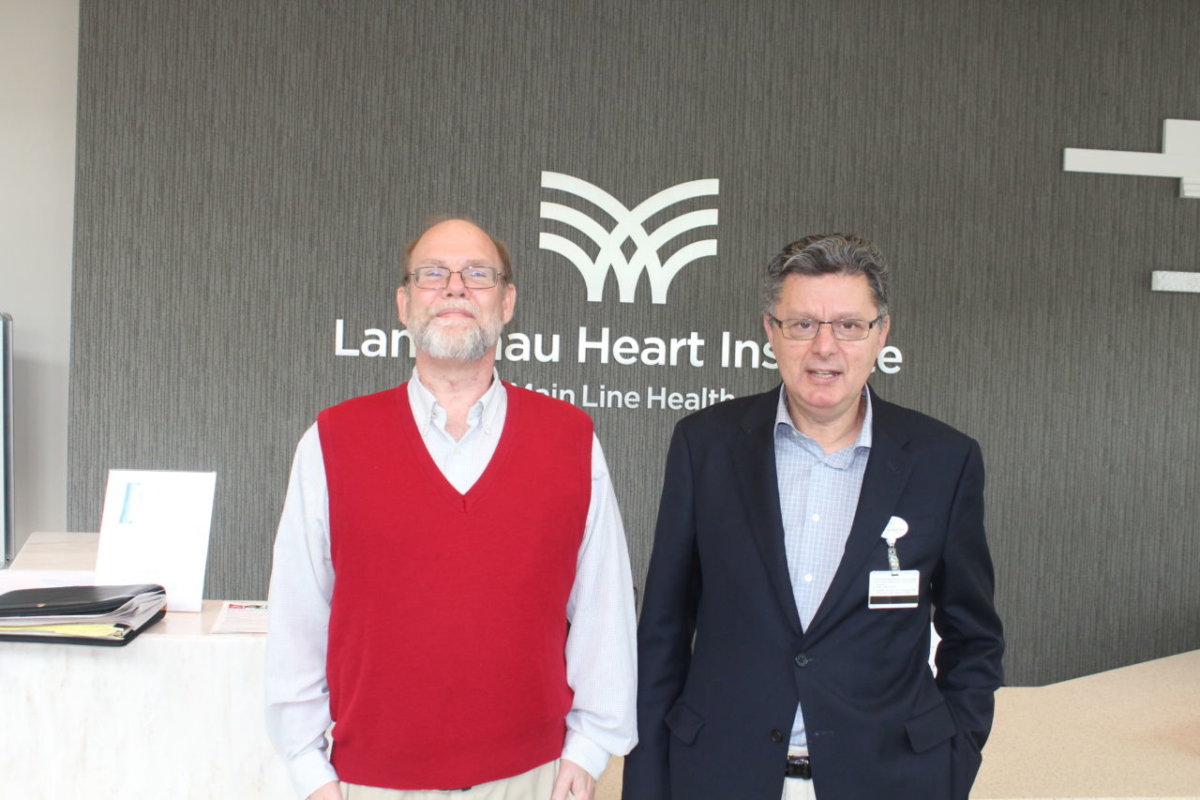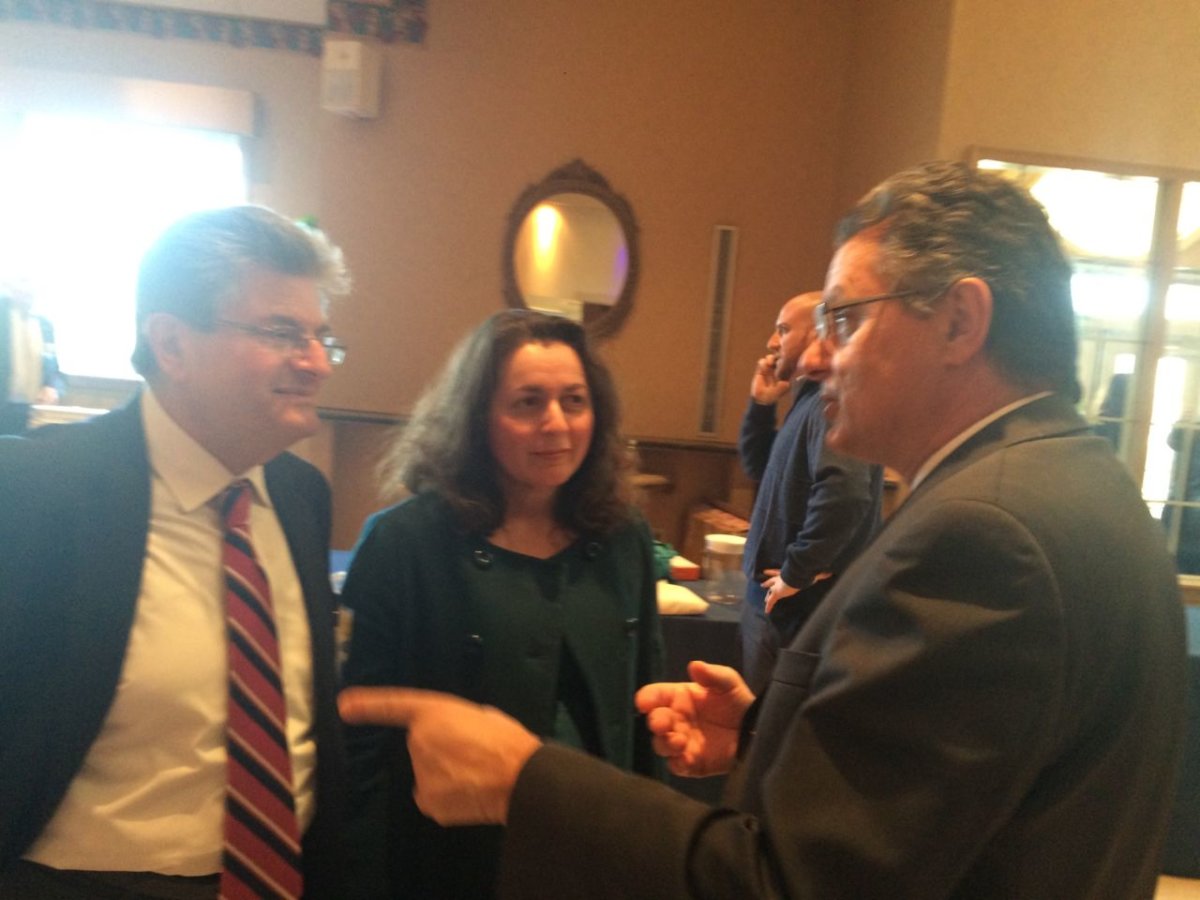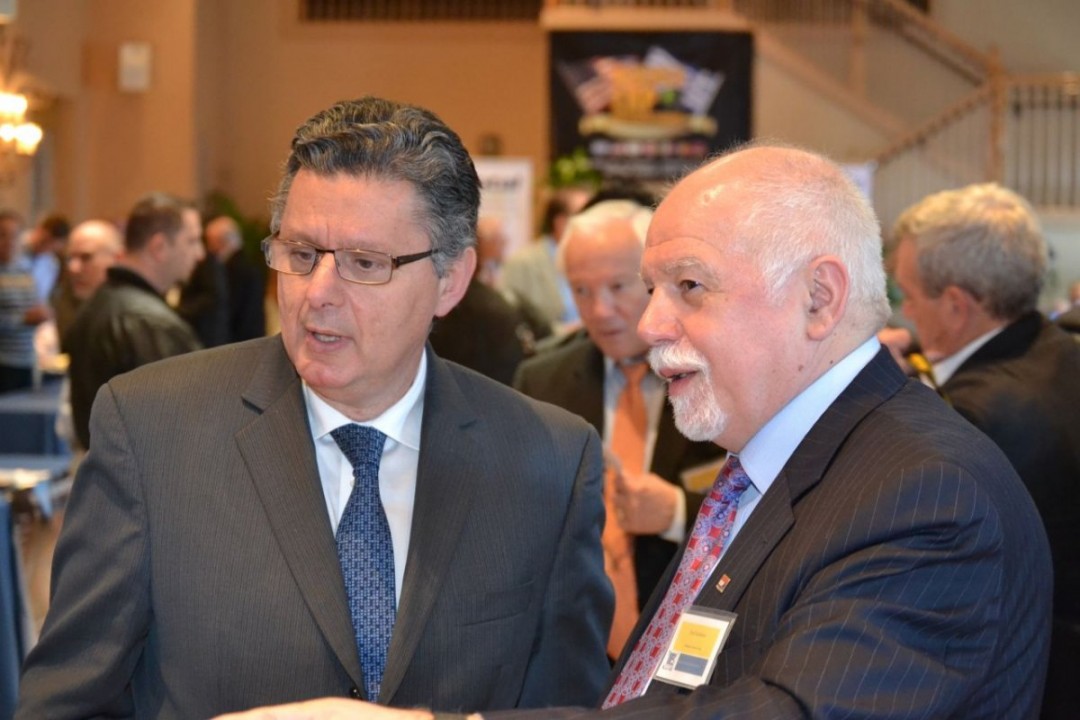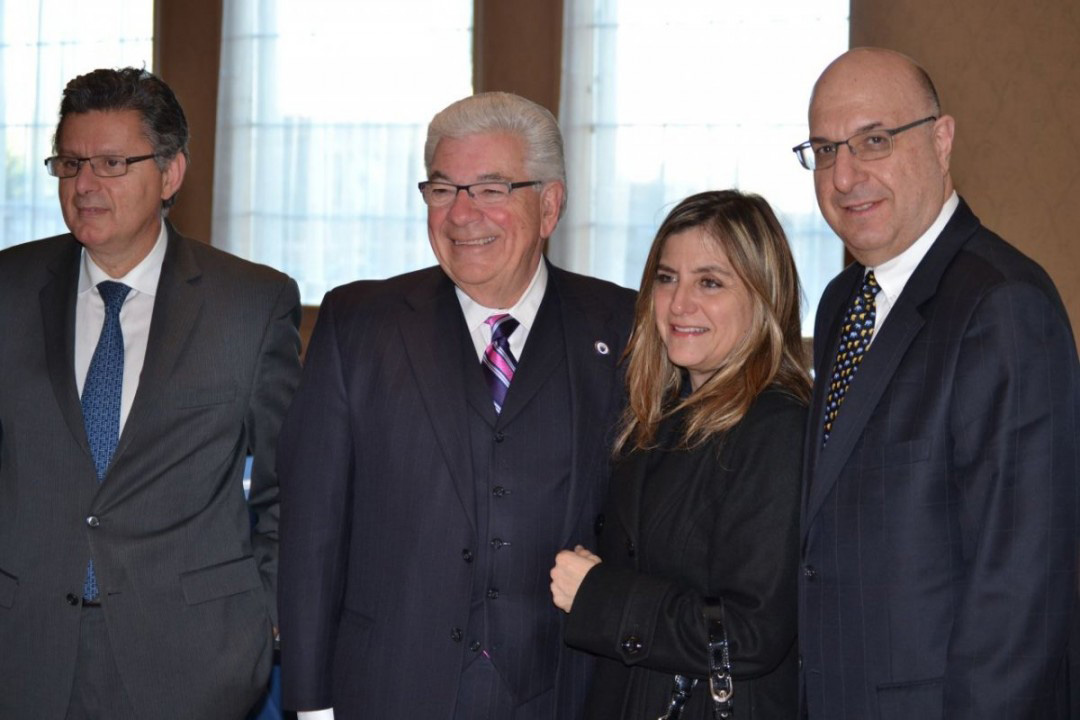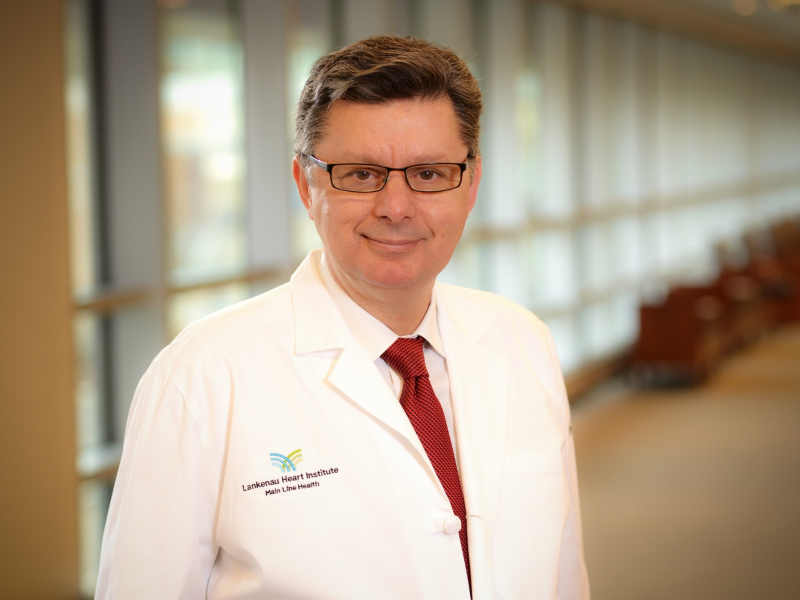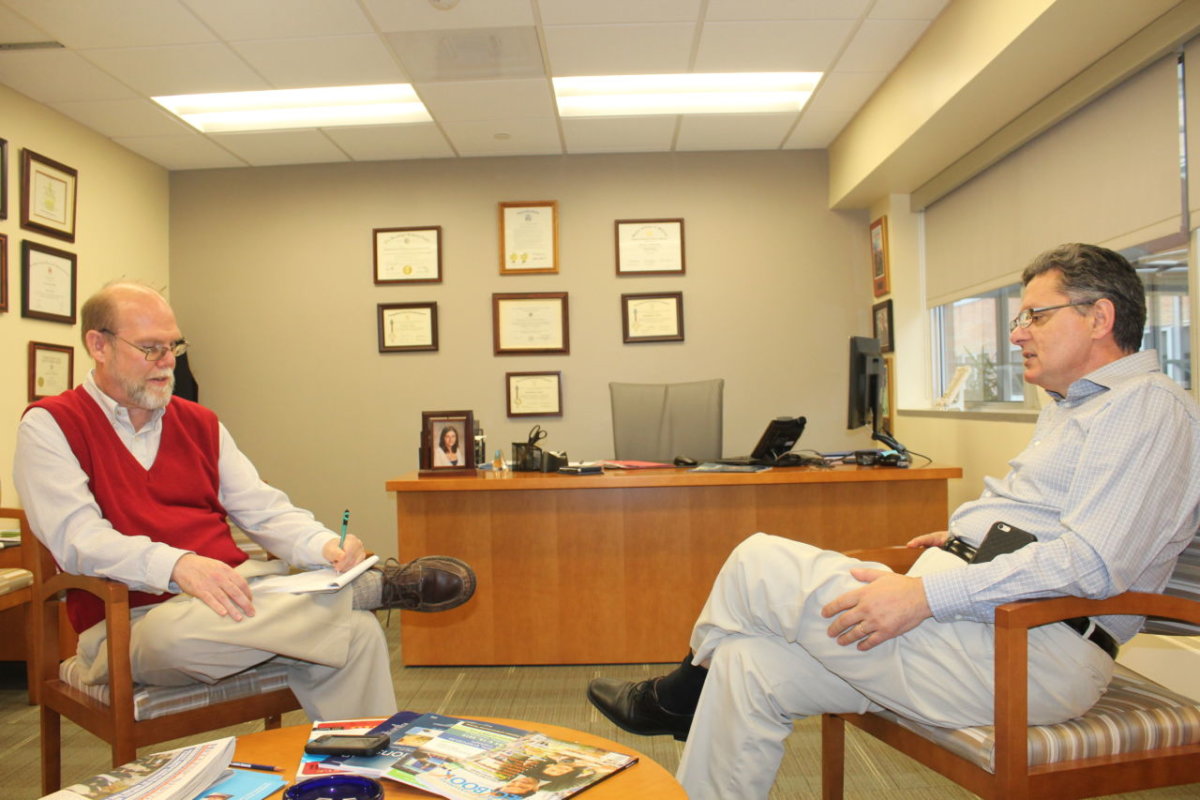By David Bjorkgren, Special to the Hellenic News of America
For Dr. Konstandinos Plestis, it was luck, mixed with skill and hard work, that took him all the way from his home village of Mandra in Greece and led him on a journey ending at the Lankenau Heart Institute in Wynnewood, Pa. The nationally recognized leader in cardiac surgery is celebrating his second year anniversary as chief of Cardiothoracic and Vascular Surgery at the Main Line Health facility.
“I believe people are given an opportunity in life, once or twice, so I was lucky enough, fortunate enough to recognize an opportunity and take it,” Dr. Plestis said during a May 21 interview in his office.
Dr. Plestis has more than 20 years of aortic surgical experience and more than 1,225 aortic surgical procedures behind him.
He learned to appreciate cardiac surgery during medical school and his residency. “I liked very much that you… help people and you help them very effectively and very quickly,” the 53-year-old said.
He also had the privilege to work with outstanding physicians in the field. He was the protégé of Dr. Michael DeBakey, who pioneered cardiac surgery in America. Dr. DeBakey was one of the first surgeons to perform coronary artery bypass surgery.
“Having dealt with people of that caliber it makes you love the same thing so much easier,” Dr. Plestis said. “The fact that life brings you to these individuals, that makes an impact on one’s career.”
A Journey begins
Born in Mandra, in northeastern Greece, Dr. Plestis says his family has roots in that village going back a few hundred years. Mandra, or “wall,” is a reference to the wall the community built 200 to 300 years ago to protect them during battles with the Turks.
The residents all came from the northern part of Greece and it was a close community growing up, where everyone was intimately involved in each other’s business. He jokes, “In a way, if I did something wrong, the neighbor would spank me.”
Dr. Plestis started his medical training in Greece, earning his medical degree in 1987 from Aristotelian University Medical School in Thessaloniki, Greece. When a three-month internship at New England Deaconess Hospital in Boston opened up that year, Dr. Plestis couldn’t pass it up and he was on his way to the United States.
It was there he met students from Harvard University. “I met some of the smartest people ever imaginable that were existing,” he said. Dr. Plestis, who had always been a good student and thought he was good in what he did, realized then there were people smarter than himself.
“The intellectual challenges and ability to advance were much better here,” he said. “The ability to get to the top of your field was here. The decision to come here was very easy.”
He completed a General Surgery residency in 1993 at Brooklyn Hospital Center in New York, a Vascular Surgery residency in 1995 at Baylor College of Medicine in Houston, where he trained with Michael DeBakey, MD; and a Cardiothoracic Surgery Residency in 1999 at Montefiore Medical Center/Albert Einstein College of Medicine in the Bronx, New York. Those experiences allowed Dr. Plestis to eventually be board certified in general surgery, vascular surgery and cardiac surgery, one of only .5 percent of surgeons with this combination in the United States.
He served as associate director of Aortic Surgery and assistant professor of Cardiothoracic Surgery at Mount Sinai Medical Center in New York. He left and went to Lenox Hill Hospital in New York City, serving as director of Aortic Surgery and the Aortic Wellness Center, before finally taking his new position as chief cardiothoracic surgeon at Main Line Health’s Lankenau Heart Institute in 2014.
Main Line Health
Dr. Plestis said he was impressed with Main Line Health from the beginning, particularly with the people who worked there, so it wasn’t a hard decision to move from New York with his family.
“One thing that impressed me very much with this organization was it was patient-centered from the time you get to the hospital to long after the discharge of the patient. When I talk about that I’m talking about the people that clean the rooms, the nurses taking care of the patients, the patient liaison that help the families go through a very difficult period in their life, facing open heart surgery. The care in the intensive care unit was absolutely unique. I have been in many places and this is a unique commitment.”
He was most impressed to find that people had been working for Main Line Health for 20, 25, 30 years.
“That speaks volumes,” he said. “It created a gut feeling that this was the place for me.”
Dr. Plestis wakes up every morning with a passion for the work he does. He compares it to the work of a painter like Picasso. “I think like in art, when you have an intellectual challenge and then you take the paintings and you paint something, you translate what you have in your brain to painting, that gives you the absolute most satisfaction, because you use everything,” Dr. Plestis said.
Similarly, with cardiac surgery, you have the intellectual challenge combined with using your hands to execute a technical, complex process. “You can translate intellectual challenge to a practical execution of an operation and fix the problem,” he said. “I cannot find any other things in life that can be the most challenging and most satisfying than dealing with human life.”
Leading a team
Dr. Plestis hopes he inspires his staff with that same passion.
“You want to bring them with you to the next level,” he said.
The key to a successful staff and department is to enable them to reach their potential, to listen to what they say and allow them to do their jobs. That is what makes the difference, according to Dr. Plestis.
“One person is not big enough, or significant enough or strong enough to be able to do everything,” he said.
When he puts a team together, he looks for character, talent and work ethic. You need a person with good character who can work with a team and move forward together. You have to be talented because otherwise, you may work very hard but you may never develop the potential. And you have to have a work ethic.
“Ninety five percent of what we do is work,” he pointed out.
On the frontline
This is an exciting time to be a cardiac surgeon, particularly at Lankenau, as Dr. Plestis and his staff develop and utilize frontline techniques and new technologies offering minimally invasive surgeries, with less pain, less recovery time and fewer complications.
“The reality is that the history of cardiac surgery is only 50 or 60 years old but in that period of time there have been very dramatic changes,” he said. The 20th Century focused on how to perform heart surgery and keep a patient alive during the procedure. That problem has been solved. “It’s done. For the most part, we have managed to take care of that.”
Now the overriding question is, how do you do a complex procedure in the least invasive way for the individual to simplify the life of that person?
In traditional heart surgery you make a large cut. There’s a lot of pain. The recovery period may be three months.
At Lankenau, they try a different approach. Surgeons make a small incision, the size of a small hole and perform heart surgery through that little cut. “You can still access everything in the human body through that,” but it’s much better for the patient in terms of pain and recovery,” Dr. Plestis said.
Robotic equipment, special cameras and special instruments allow that access. “This is where people like me…a few of my partners, we have been on the front line of exploring this possibility and applying it to our patients and we have seen such dramatic differences in terms of the outcome and patient satisfaction,” Dr. Plestis said.
There’s more to this new approach than machines, though.
“The talent, technique of the surgeon or the people involved is extremely important. You wish one day that people could go through a machine and the robots will go in and fix everything. We’re not there yet, so, yes, the human factor is an extremely important factor in this process because the human hands still have to direct that technology,” Dr. Plestis said.
He reports that between 70 and 82 percent of full valve surgeries done at Lankenau are done using minimally invasive procedures. The average around the globe is only 25 percent.
In fact, the Lankenau Heart Institute is leading the way across the globe in its ability to perform complex procedures in all aspects of cardiac surgery. It is in the top 1 percent of institutions worldwide that can offer such services, Dr. Plestis said.
Newer techniques being used at Lankenau, ones that sound like something out of science fiction, promise no incisions.
“We can go from the groin up and do a valve inside people without doing any surgery at all, without opening those people at all,” Dr. Plestis said. The procedure, known as transcatheter aortic valve replacement, inserts a new valve, positions it, then removes the delivery system without the need for open heart surgery. It is available to patients when surgery is too risky. A team at Lankenau has performed 250 of these procedures since 2012.
A key to Lankenau’s success in cardiac procedures is its focus on super specialization. In 2014, Dr. Plestis organized the Aortic Wellness Center at the Institute, assembling a team of specialists to provide treatment for all aspects of aortic disease.
“We have developed here specialists who are dedicated exclusively to do a procedure to perfection based on 21st century standards,” he said. “If you focus on something and do it over and over and over you do it very, very well. Not only do you do it very well, but you become an innovator in that process because the repetition of the same procedure over and over gives you the opportunity to think about it, it gives you an opportunity to look where you can improve. This is how you become a specialist in the procedure. Here we are fortunate enough to have some of the top notch guys all over the United States in aortic surgery, valve surgery and coronary surgery.”
Returning to Greece
Dr. Plestis makes it back to Greece when he can, visiting with family and performing surgery.
“Greece was very good to me. I was in medical school in Greece. For the most part the Greek government took care of that for me,” he said. “For that I’m always indebted to my country. You can’t forget that.”
Dr. Plestis says there are a lot of patients in Greece who cannot come to the United States to be treated for the complex heart problems they may have, so he goes there to help them out.
“I do surgery in Greece so this is a way to give back to my country for some of the things that I was fortunate enough to achieve based on that initial education,” he said.
His time in Greece also include visits with his brother, sister, mother and a large extended family. He speaks proudly of his family’s ethics and belief in hard work. “My father said, ‘do your job, don’t worry about the politics around it.’”
Acknowledging that his heart is Greek, Dr. Plestis is proud to see so many successful people in the Greek American community who value those same ethics, hard work and education.
“Greeks are good people with a good heart. They are very welcoming and they are very positive and they are hard-working, which makes them successful,” he said.
